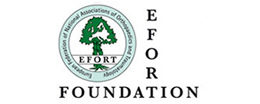The Health First Europe and EFORT partnership
EFORT is a member of Health First Europe (HFE), a non-profit, non-commercial alliance of patients, healthcare workers, academics and healthcare experts and the medical technology industry. Health First Europe aims to ensure that equitable access to modern, innovative and reliable medical technology and healthcare is regarded as a vital investment in the future of Europe.
One of the key topic of Health First Europe is on patient safety and healthcare associated infections, a topic HFE has been following since 2004. The collaboration with EFORT, has been so far concentrated around this topic, and particularly around the EU Joint Action on Patient Safety and Quality of Care (PaSQ), a three year EU-funded project with Member States, launched in May 2013, which aims to consolidate a permanent network for patient safety in the EU through the sharing of information and experiences, and the implementation of good practices.
This collaboration offered the opportunity for national societies to promote their work and share best practice on safe clinical practices, with the aim to be exchanged on a clinical level throughout all Member States. It is in this context that the German Arthroplasty Register, EPRD, was presented. Under the EU Joint Action, these safe clinical practices should be exchanged across all participating Member States in the Joint Action via a wiki platform.
Patient safety and healthcare associated infections are on the EU agenda and there is a growing consensus that this topic should receive more attention from governments. The European Commission released in November 2011 a report looking at Member States implementation of measures to prevent healthcare associated infections (HAI) and increase patient safety. The report calls for greater efforts from Member States and particularly in the following areas:
- Information to patients
- Education and training of the health workforce
The Commission is currently assessing the need for further action in the field and the European Parliament has adopted a Resolution in October 2013 calling for greater prioritisation of Patient Safety and HAI at EU and national level.
Within this context, EFORT is well placed to share best practice in the area of education and training of healthcare professionals and to inform the debate on patient safety and HAI. The issue of Patient Safety is of uppermost importance in Orthopaedic and musculoskeletal-traumatology surgery, which is why it was the key focus of the 15th EFORT Congress London 2014.
More information
- The Health First Europe website: www.healthfirsteurope.org
- The EU Joint Action on Patient Safety and Quality of Care: www.pasq.eu
- European Commission activities on patient safety
Consultation on: Future EU agenda Quality of health care
The European Federation of National Associations of Orthopaedics and Traumatology (EFORT) is the platform organisation linking Europe‘s national orthopaedic associations. Its aims to promote the exchange of scientific knowledge and experience in the field of prevention, conservative and surgical treatment of diseases and injuries concerning the musculoskeletal system. To this end, particular emphasis is placed upon activities focusing on education and research. EFORT represents 41 national member societies from 39 member countries, as well as nine associate scientific members.
The EFORT Annual Congress London 2014 focused on Patient Safety. With Patient Safety as the overarching theme of the 2014 Congress, EFORT aimed to deliver the best educational sessions to improve orthopaedic health care in Europe in order to meet the increasing expectations of an ageing population that wants to maintain an active life during retirement.
The main theme of the EFORT Congress Prague 2015 was infection, which helped putting the issue of patient safety and care quality at the heart of the Orthopaedic and Trauma practice.
EFORT is committed to promote the highest standards of medical practice in order to achieve excellence in care for all patients across Europe.
More information
- EFORT Response to the Consultation | PDF document | 4 pages | 312kb
- EFORT Patient Safety brochure for the EFORT 2014 Congress | PDF document | 20 pages | 2.6Mb
- European Commission activities on patient safety
EFORT Response to the Consultation
Today’s patients throughout Europe are entitled to the most optimal care. Progress in surgery has been phenomenal in this last decade and new techniques and processes have allowed consistently successful outcomes for complex procedures. However, the best of surgical care is only relevant if applied to the right patient, to the right site and with minimal complications such as post-operative infections.
Wrong site surgery, which still occurs today, too often i.e up to fifty times a week in Europe, must be eliminated by careful positive patient identification and the use of checklists. A large international study (N Engl J Med 2009) revealed that morbidity dropped from 1.5 per cent to 0.8 per cent following the introduction of checklists. The rate of complications also fell from eleven to seven per cent.
Nosocomial infections kill more patients than road traffic accidents throughout Europe. They must be abolished by heightening the awareness for the necessity of hand hygiene measures such as alcohol rub application after each patient encounter by hospital personnel.
Implant and procedure related complications must be curtailed by traceability programs and by the use of implant registries throughout Europe.
The occurrence of undesirable effects and interactions of prescribed drugs must be eradicated by the use of computer aide prescription systems.
Educational programs must be set up throughout Europe to promote best practices and avoid physician errors in indications and use of the available sophisticated equipment and procedures.
It is only by applying proactively these basic patient-safety measures that patients will benefit wholly of the sophisticated surgical procedures available today while minimizing the risk of complications and untoward outcomes.
EFORT is sharing the expert view, that the EU Commission could play a crucial role in supporting important actions to be taken at the European level in order to improve quality of health care and safety of patients.
If patients as well as health professionals shall develop new future roles as expressed in the executive summary, it is necessary to strengthen specific education and training tools. In particular the following comments shall be made:
Executive Summary
274: It is very important, that the experts “recognise the importance of allocating more funds to research activities aimed at investigating the possible strategies to scale up the resilience of health systems to promptly respond to upcoming challenges”. It would also be necessary to raise the expenses for education and training, but this recommendation cannot be found in the opinion at all.
282: It is unclear, how the proposed development of “a Europe-wide health education program encompassing health literacy, patient safety and health care” can be achieved. Neither in the Executive Summary nor in the subsequent chapters of the opinion a detailed proposal with appropriate listing of measures is outlined, explaining how this important goal can be reached. Only a very short set of actions can be found in chapter 3.6. (1669 – 1686). They also contain some aspects for the proposed “Education of health professionals and patient empowerment” listed on the nano level of table 1 (line 396), but it does not reflect the high significance of this proposal at all. In this context it shall be pointed out, that the Relevant Framework Programs’ EU Projects on quality/safety (table 4 and 5) does only contain one specific program on patient empowerment (Empowering patients with chronic diseases (EMPATHIE); tender EAHC 2013/health04). From our point of view there should be more programs giving support in this important field of patients safety.
3.2 Core dimensions for quality services in health care
822 (table 7): It is doubtful, whether the “establishment of Information Systems on the extent, types and causes of errors, adverse event and misses” is an appropriate and sufficient tool for development of patient safety information and learning systems. “Education and training of health care workers, management and administrative staff in health care setting” is important to promote patient safety and should indeed be embedded in undergraduate as well as postgraduate training. More and detailed information on how to achieve this, is lacking.
825 (table 8): The recommendations to ensure “continuous education, access and use of evidence based information” through developing, maintaining, disseminating and stimulating adherence to adequate Guidelines and evidence based medicine tools cannot be overestimated. It is, however, absolutely unclear, how “training programmes for health professionals in order to guarantee that they can apply current professional knowledge” will be realized in the future throughout whole Europe.
3.4.2. Elements of health care
1164 – 1234: In this important chapter essential requirements for future improvement of patient care are outlined: qualifications necessary to be considered as a health professional (i.e. monitoring, renewal and extension of licensing) and the assuring, that enough health professionals are available to provide care. No opinion is provided, however on how these important prerequisites will be approached.
3.6. Proposed actions at EU-level
1585: This Chapter highlights the 21st Century as a period where health systems are confronted with new challenges as well as with new opportunities. It is true that the EU Commission could play a crucial role in boosting the improvement of the quality of health care and the safety of patients. The listed actions are important and it is especially helpful, to find here – for the first time – some more information on how “Education and training in their new roles for both patients and health professionals” (1669 – 1686) can be executed. This important measure should be highlighted also in the executive summary, however. In “Miscellaneous recommendations” (1730 – 1732) it is stated that European member states shall be supported “in defining and developing clear processes to regulate health professionals across the EU in order to ensure that national and foreign health professionals are qualified and fit to practice”. We agree that this is a very important task and would propose to address every initiative in order to support it.
In general we agree with the opinion, that education of health professionals and patients (patient empowerment) is a promising tool for enhancing health care quality and especially patient safety. It is necessary, however, to debate appropriate initiatives how to achieve this goal and to provide adequate finance resources on national and/or supra-national levels.
1662 HP: Promote the use of registries to collect data on health care quality and efficiency of different treatment options
We agree with the Opinion of the experts that the use of registries to measure and monitor the efficiency and quality of care can help to build the evidence base for quality improvement. Building information systems, such as patient’s registries, post-market efficacy studies for assessment of risk benefit, or comparative (relative) effectiveness research, are needed for assessing quality.
In Orthopaedics, registries provide an inventory of treatment outcomes in arthroplasty – e.g. for hip fracture patients -, thus facilitating production control, but also because awareness of these outcomes helps to improve quality and bring about improvements for large groups of patients. Registries also offer an opportunity to assess the major changes in the medical care organization and lead to improved treatment and more efficient utilization of resources.
With the upcoming revision legislation on medical devices, registries are becoming even more crucial in ensuring safe devices.
1633 HP: to develop and promote European guidelines and checklists for similar conditions across EU MS and regions to ensure common approaches and procedures
Scientific Societies, such as EFORT should be consulted in the elaboration of Patient Safety Guidelines and checklists to ensure practical and evidence-based recommendations.
Checklists are at the core of the orthopaedic surgery. EFORT promotes the use of checklists before, during and after surgery. Studies have demonstrated that the implementation of surgical checklist can significantly reduce morbidity and complication rates amongst orthopaedic patients, thus ensuring patient safety.
1668 Education and training in their new roles for both patients and health professionals
1669 HP: to continue supporting MS in promoting continuing education and training programmes to improve the quality of health care services and to promote revalidation of Doctors with an appraisal every 5 years, including patient safety education and training.
With the increased mobility of patients (as conferred by the EU Directive 2011/24/EU on patients’ rights in cross-border healthcare) and the mobility of professionals, harmonising orthopaedic and trauma education throughout Europe is a prerequisite to patient safety and care quality. This would resolve the disparities between countries in the duration and content of training. We have a vested interest in training and, more specifically, in continuing professional development. In the UK for instance, surgeons have to revalidate every five years to prove that they are still fit to practice. The British Orthopaedic Association (BOA) operates a revalidation process that obliges orthopaedic surgeons to be retested every five years, and other European countries are in the process of instituting similar systems, or have already done so. The first beneficiaries of such systems are the patients, who can be assured to receive adequate and up-to-date care.
1625 HP: To establish an EU Health Care Quality Board (Management/Team) for the coordination of all EU initiatives in HCQ.
We support the establishment of an EU Health Care Quality Board and encourage the participation of Scientific Societies and Patient Groups as well as Hospitals Managers, through a transparent procedure.
More information:
- EFORT Response to the Consultation | PDF document | 4 pages | 312kb
- EFORT Patient Safety brochure for the EFORT 2014 Congress | PDF document | 20 pages | 2.6Mb
- European Commission activities on patient safety


